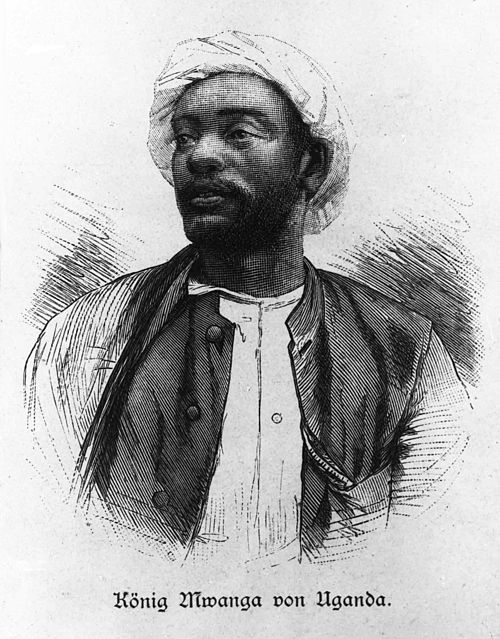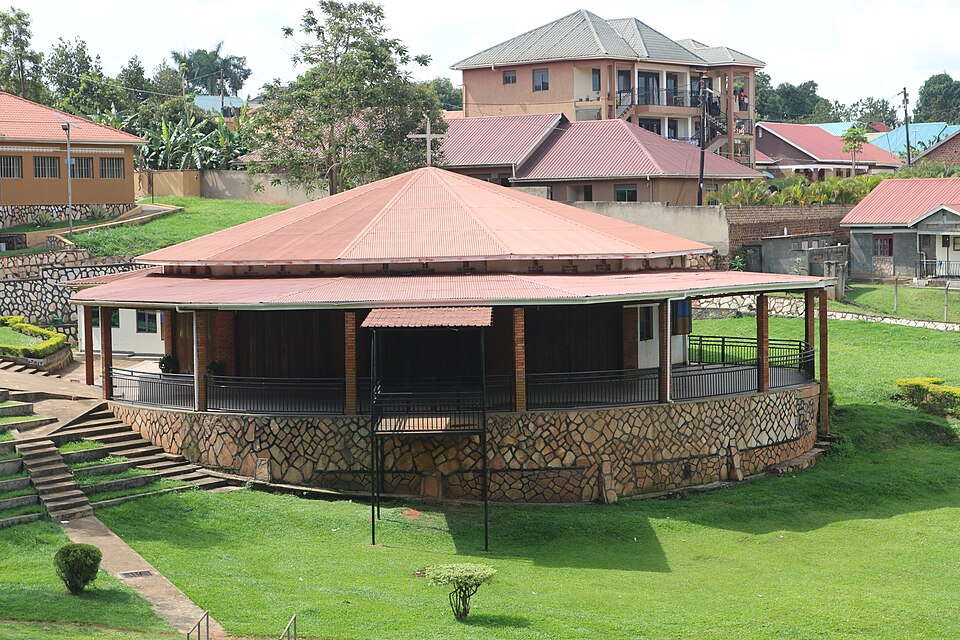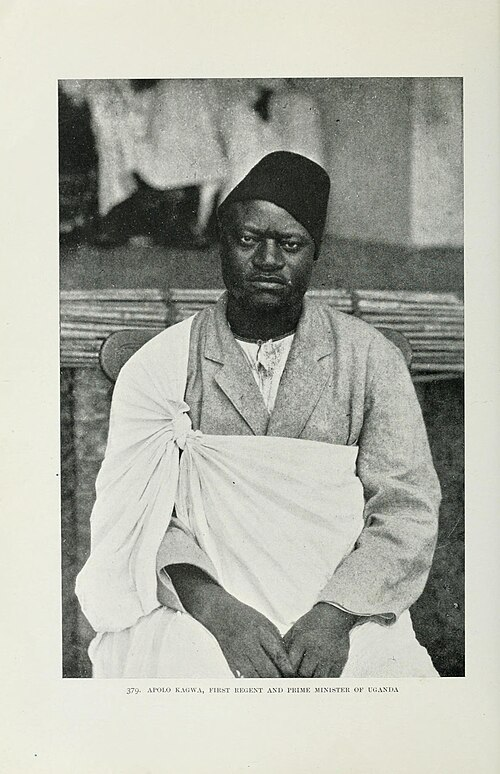IB Syllabus focus:
'Explore the dynamics of resistance and collaboration in Buganda, focusing on figures like Kabaka Mwanga and Apolo Kagwa, and the reasons for their success and failure in their interactions with colonial powers.'
The historical narrative of Buganda during the late 19th and early 20th centuries is a testament to the complexity of African responses to European imperialism. This period saw the Bugandan kingdom under the leadership of Kabaka Mwanga II and later, the influential prime minister, Apolo Kagwa, navigating through the turbulent waters of colonial intrusion, employing both resistance and collaboration.
Kabaka Mwanga II: Resistance to Imperialism
Mwanga II, who became the Kabaka of Buganda in 1884, was a young ruler faced with the daunting task of maintaining sovereignty in the face of European encroachment.

Kabaka Mwanga II (r. 1884–1897), whose early defiance of missionaries and British encroachment framed Buganda’s initial strategy of resistance. His actions—including ordering executions of Christian converts—must be read against the struggle to preserve royal authority and autonomy. Source
Early Defiance and Opposition
Religious Influence: Mwanga II's initial opposition to European imperialism was closely tied to his resistance to the Christian missionaries whose conversions threatened his authority.
Execution of Converts: In a bid to stem the influence of Christianity, Mwanga ordered the execution of several converts, including the famous Christian martyrs of Uganda in 1885 and 1886.

Namugongo, the principal site of the 1886 executions of Christian converts later known as the Uganda Martyrs; the modern shrine marks the place of their death under Mwanga II. Although the structure is contemporary, it helps locate a pivotal episode in Buganda’s religious and political conflict. Source
Political Autonomy: Mwanga's consistent objective was the preservation of Buganda’s political structures and independence, which he saw as being undermined by European treaties.
The Religious Wars and British Influence
Civil War: The religious divisions fostered by competing Christian missionaries resulted in a civil war, weakening the kingdom and distracting it from the external threat of imperialism.
Manipulation by the British: The British used these divisions to their advantage, manipulating local politics to establish a foothold in the region through the Imperial British East Africa Company.
The Struggle for Autonomy
Rebellion Against the Company: The high point of Mwanga's resistance was the rebellion against the authority of the British East Africa Company, where he sought external support from German East Africa.
Exile and Abdication: The rebellion's failure forced Mwanga into exile, and he was subsequently deposed, marking a critical failure of armed resistance against imperialism in Buganda.
Apolo Kagwa: The Path of Collaboration
Following Mwanga II, the kingdom's strategy shifted under the stewardship of Apolo Kagwa, whose approach was characterised by pragmatism and an eye for the long-term well-being of Buganda.
Diplomacy and Strategic Alliance
Political Realism: Kagwa was a realist who saw the futility in opposing the British militarily and chose to engage them diplomatically.
Negotiation Skills: He adeptly negotiated with the British, recognising their technological and organisational advantages.
The Buganda Agreement of 1900
Negotiating Autonomy: Kagwa was instrumental in the Buganda Agreement of 1900, which, while placing Buganda under British protection, allowed it to maintain a substantial degree of internal autonomy.

Apolo Kagwa, Katikkiro (prime minister) and regent, whose negotiations with British officials shaped the 1900 Agreement and entrenched chiefly power. His pragmatic collaboration enabled institutional continuity while aligning Buganda with the protectorate’s administrative order. Source
Land and Power: The agreement secured land rights for the Ganda chiefs, a significant victory preserving the kingdom's social hierarchy.
Modernisation and Reforms
Administrative Reforms: Kagwa introduced modern administrative reforms, streamlining governance, and facilitating the implementation of British colonial policies.
Economic Transformation: He promoted the introduction of cash crops, especially cotton, transforming Buganda’s economy and aligning it with global markets.
Kagwa's Enduring Influence
Cultural Retention: While collaborating with the British, Kagwa managed to retain Buganda's cultural institutions and practices.
Educational Progress: He fostered educational development, realising its importance for future self-governance and societal advancement.
Dynamics of Resistance and Collaboration
The starkly different approaches of Mwanga and Kagwa towards the British colonial powers demonstrate the internal debate within Buganda regarding the response to imperialism.
Factors Influencing Resistance
Cultural Integrity: Mwanga was motivated by a desire to maintain cultural integrity and religious traditions against the tide of Christian conversion.
Military Pride: Despite having a less advanced military, there was a strong sentiment within the kingdom to resist and maintain the warrior tradition.
Social Cohesion: Resistance to foreign rule was also a unifying factor for the Bugandan people, reinforcing social cohesion under the Kabaka's leadership.
Factors Influencing Collaboration
Political Acumen: Kagwa’s political acumen led him to collaborate, realising the kingdom’s limited options against the British Empire’s might.
Socioeconomic Benefits: Collaboration promised immediate socioeconomic benefits and preservation of the status quo for the Ganda aristocracy.
Long-term Vision: Kagwa had a vision of a modern Buganda, aligning with British interests as a strategic move towards modernisation.
Success and Failure in Interactions with Colonial Powers
The legacies of Mwanga’s resistance and Kagwa’s collaboration offer valuable insights into the successes and failures in Buganda's interactions with British colonialism.
Outcomes of Resistance
Short-term Unity: Mwanga’s resistance efforts initially rallied his subjects against a common enemy but were unsustainable in the face of superior British military technology.
Loss of Sovereignty: The failure of armed resistance led to a loss of sovereignty and the eventual imposition of direct colonial rule.
Outcomes of Collaboration
Preserved Autonomy: Kagwa’s collaborative efforts ensured that Buganda retained a measure of self-rule and cultural autonomy within the British Empire.
Economic Development: Collaboration brought about economic development through the introduction of new cash crops and trade opportunities.
Reflections on Buganda’s Path
In assessing the historical path taken by Buganda during the era of European imperialism, the actions of leaders like Mwanga and Kagwa are pivotal. Their decisions, whether in resistance or collaboration, were shaped by the imperative to navigate an era of profound change and challenge. The complexities of their choices continue to be subjects of reflection and analysis, offering a window into the broader patterns of African resistance and adaptation in the face of colonial expansion.
FAQ
The external powers, notably the Germans and the British, had a profound impact on the power dynamics within Buganda. Mwanga II initially sought German support as a counterbalance to British influence. The Germans, who were colonising neighbouring territories, appeared as potential allies against British imperialism. However, the British solidified their position in Buganda by exploiting the kingdom's internal religious divisions and aligning with rival factions against Mwanga. The Anglo-German Agreement of 1890, which partitioned East Africa, left Buganda firmly within the British sphere of influence, isolating Mwanga and diminishing his ability to resist effectively. This external interference exacerbated the kingdom's internal divisions, undermined Mwanga's authority, and enabled the British to establish control over Buganda with relative ease.
The Buganda Agreement of 1900 had a significant impact on the kingdom's legal and land tenure systems. It codified the allocation of land into 'Mailo' estates, which created a legal framework for land ownership that recognised the rights of the chiefs and other notables. This arrangement solidified the status and power of the Ganda aristocracy, who became landlords, while the peasantry became tenant farmers, fundamentally changing the relationship between the people and the land. The agreement also introduced Western legal concepts, which began to replace the traditional Ganda legal systems. However, while it formalised the kingdom’s administrative structures and established a legal basis for governance, it also sowed the seeds for future land disputes and dissatisfaction among those who felt disenfranchised by the new system.
The British colonial administration astutely used the existing political structures in Buganda to exert their control, a method commonly referred to as 'indirect rule'. By co-opting the Ganda chiefs and granting them authority under the colonial system, the British were able to maintain order and collect taxes with minimal resistance. This had the effect of preserving the façade of traditional governance, with the Kabaka and chiefs retaining nominal powers, but in reality, they were increasingly subordinate to the colonial authorities. Traditional governance was thus transformed, as the roles and responsibilities of the chiefs were now defined and limited by the colonial legal framework. Over time, this erosion of traditional authority structures resulted in a shift in power dynamics within Ganda society and affected the kingdom's cultural and political autonomy.
During Mwanga II's reign, Buganda experienced significant religious unrest, primarily involving three main factions: the Roman Catholics, the Anglicans, and the Muslims. These religious groups were introduced by foreign missionaries and converted significant portions of the Bugandan population, including some in the royal court. This led to a power struggle as each faction vied for influence, creating a volatile political climate that Mwanga viewed as a threat to his authority. The divisions caused by these religious factions eventually weakened the kingdom’s central authority, making it more susceptible to British manipulation and control. This internal strife significantly affected Buganda's stability by fracturing its unity and distracting it from the impending threat of colonial imperialism.
Apolo Kagwa's collaboration with the British led to significant economic changes in Buganda. The introduction of cash crops, especially cotton, transformed the economy from subsistence agriculture to a cash-based system. This integration into the global economy brought new wealth to the kingdom and the Ganda elite, but also introduced economic dependency on global prices and markets. For the local populace, it meant a shift in labour from food production to cash crop cultivation, which had mixed effects. Some people benefited from increased wealth, whereas others faced disruptions to their traditional way of life. The new economy also led to the development of infrastructure, such as roads and railways, to support the export of cash crops, facilitating internal commerce and communication.
Practice Questions
Mwanga II's role was pivotal in the resistance against European imperialism in Buganda. As a young ruler, he recognised the threat posed by foreign influences, particularly the Christian missionaries who undermined his authority through conversion of his subjects. His resistance was marked by his opposition to the encroachment of Europeans and their religion, which culminated in the execution of Christian converts, a move that led to civil unrest. Despite his efforts to unite his kingdom against external forces, his lack of military technology and external support ultimately resulted in his exile and deposition, demonstrating the challenges faced by indigenous leaders in resisting European imperialism.
Apolo Kagwa's strategy of collaboration was highly effective in preserving Buganda's internal autonomy and social structure under British colonial rule. His diplomatic acumen in negotiating the Buganda Agreement of 1900 ensured that the kingdom retained considerable self-rule and safeguarded the Ganda chiefs' land rights. Kagwa's foresight in implementing administrative reforms and economic transformation, such as the introduction of cash crops, positioned Buganda favourably within the colonial framework. His collaborative approach, while controversial, enabled Buganda to adapt to colonial rule while maintaining its cultural identity, thus setting a precedent for managing colonial relationships in Africa.

